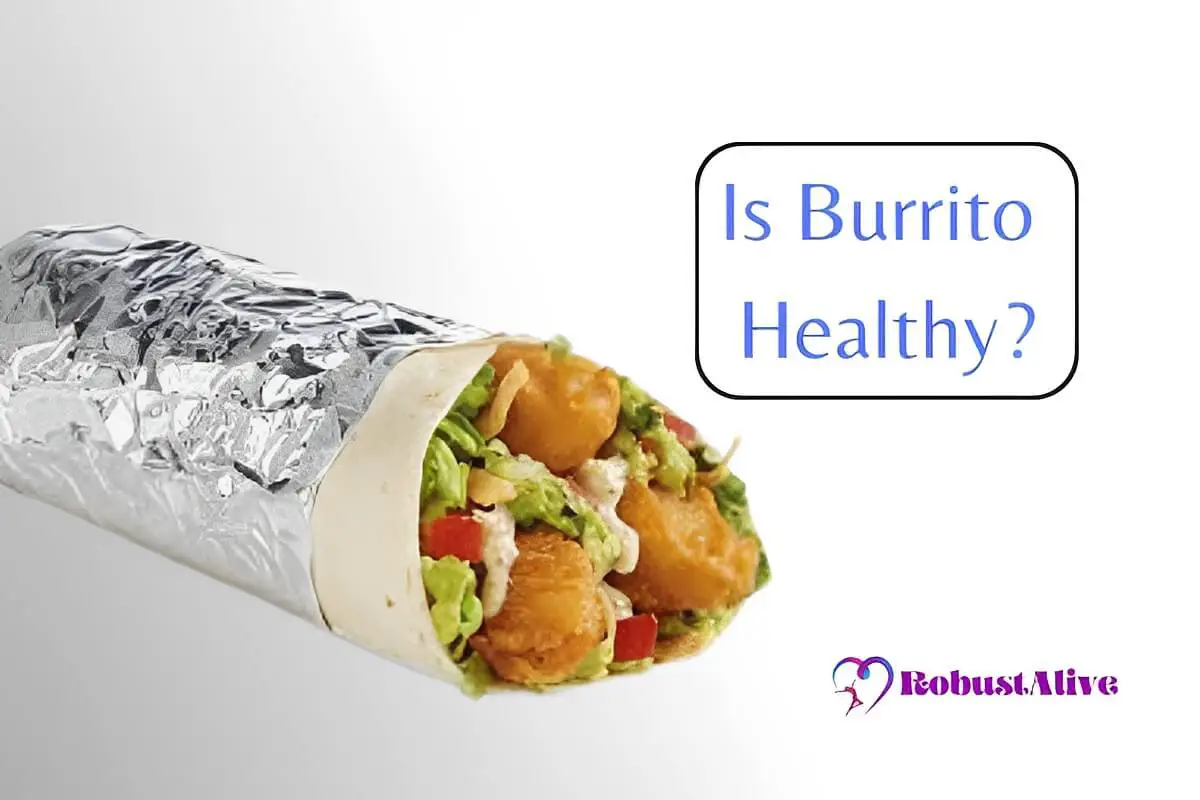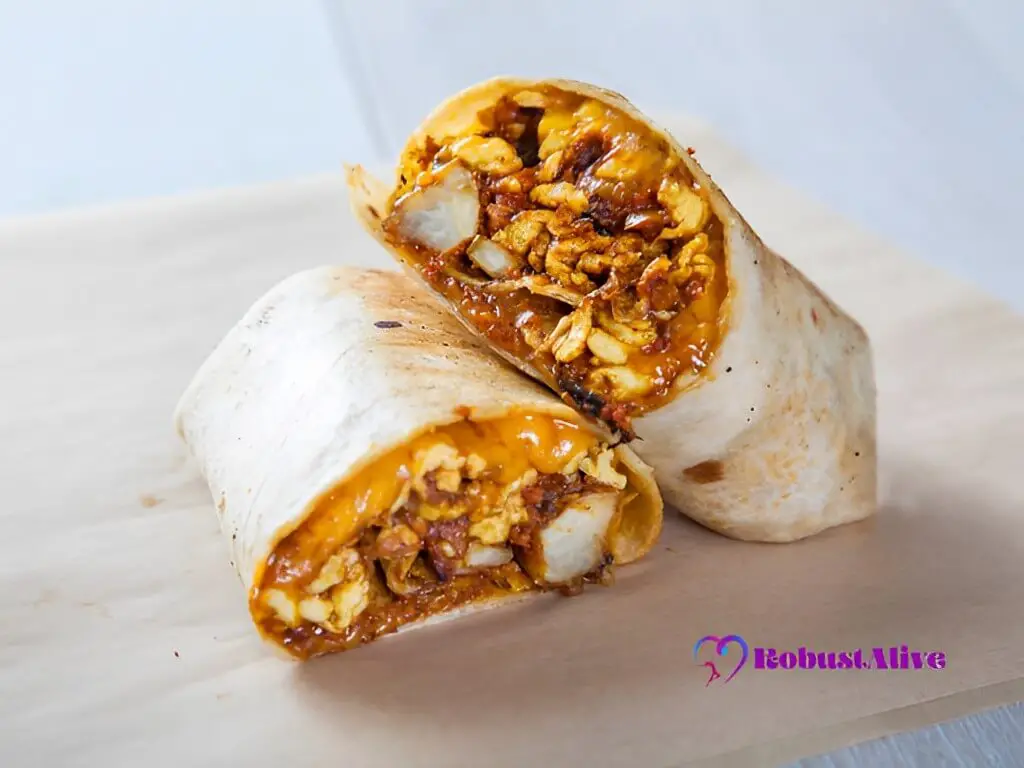Is Burrito Healthy? Unveiling the Health Benefits and Risks

Basically, the burrito is a Mexican snack that gives a tasty treat to your mouth that you may always crave. This high carbohydrate and protein content also helps boost your energy. But is burrito healthy?
In general, this Mexican tortilla is wrapped up with some stuffing. A burrito can be unhealthy if you add cheese, sour cream, and processed meat wrapped in a thick tortilla. Undoubtedly, it contains a massive amount of carbs. That won’t be considered healthy. On the contrary, you can make it healthy by adding veggies, low-carb, lean protein, and grains wrapped up in a thin tortilla.
In this article, we will tell you about the nutritional value of burritos. In addition, share the health benefits of it. Moreover, share some tips to make it healthy. So, sit tight and be ready to explore the world of healthy burritos.
Why is Burrito Healthy?
You may find a burrito either healthy or unhealthy. Choosing healthy ingredients for burritos is an essential fact. However, some other facts are also included. We can call these healthy snacks when they meet the following criteria.
- Size: A healthy burrito should be manageable in size. In total, the healthy one contains 1 pound per serving.
- Ingredients: The ingredients must be nutritious, such as vegetables, whole grains, and lean protein. Neither processed nor red meat will be used as protein.
- Tortilla: A whole wheat tortilla should be used instead of a regular flour tortilla.
- Cheese should be used in moderation to reduce calories and fat content.
- Calories: These snacks should not be too high in calories.
- Fiber: Fiber is essential for weight loss, preventing disease development, and promoting satiety. So this Mexican food, full of fiber, will be considered a healthy meal.
A healthy burrito should be well-balanced with a good mix of macronutrients such as protein, fat, carbs, micronutrients, vitamins, and minerals.
Is Burrito Healthy for Weight Loss?

Graphics Credit: Robustalive.com
Unfortunately, regular burritos are not considered healthy for weight loss. The best ingredients for a healthy burrito are fresh vegetables, baked or grilled meat, eggs, and whole-grain flour. Because they are high in calories compared to the remaining carbs and fats. Furthermore, most contain almost 1000 calories due to high-calorie ingredients such as rice, beans, cheese, sour cream, and avocado.
However, with careful portion control and ingredient swaps, it is possible to make this food fit into a healthy diet.
Is Burrito Healthy for Bodybuilding?
During the bulking phase, the average calorie intake of a male bodybuilder is 3800 calories per day, and that of a female bodybuilder is 3200 calories. Comparatively, the male needs 2400 calories during the cutting phase, while the female needs 1200 calories.
Here, a burrito (weighing 116 gm) carries almost 346 calories. You can also increase the calories by adding more cheese, sour cream, rice, beans, and chicken.
So a man on the way to becoming a bodybuilder can easily consume this food. In this case, available healthy burrito bowl ideas may help to provide 1000 calories.
Are Burritos Healthy for People with Diabetes?
Burritos can be a healthy option for people with diabetes. It becomes a diabetic-friendly meal when it is made with healthy ingredients like whole grains, beans, vegetables, and good-quality protein. You can add deviled eggs to your burrito bowl or wrap. Undeniably, deviled eggs for people with diabetes are a great option.
Moreover, vegetables and beans’ fiber lower blood cholesterol and control blood sugar levels. Avoid High-calorie and high-carb ingredients like cheese and sour cream.
Are Burritos Healthy for Pregnancy?
This Mexican tortilla wrap is an excellent and enjoyable snack for an expecting woman. Pregnant women need enough vegetables and fiber in their regular menu, which can help relieve constipation. However, Burrito in pregnancy with balanced ingredients is a must.
The ingredients should carry low carb, high protein, fiber, and low fat. Avoid cheese made with unpasteurized milk and undercooked eggs or meat to feel the wrap. However, maintaining these facts, this Mexican food can be an excellent choice for pregnant women.
Is Burrito Healthy for a Toddler?
Babies are too picky when it comes to food. Undoubtedly, It’s a daily struggle for mothers who struggle to feed their baby vegetables. Burrito can be a great solution in that case. It looks delicious to eat. A mini one filled with vegetables, cheese, beans, and well-cooked chicken can give you a special treat for your baby.
It is considered a healthy meal for a toddler until it is homemade. Because for a long-lasting fact, the ready to cook, frozen or restaurant uses a lot of preservatives in meals. Indeed, these preservatives are hazardous for the little tummy. So, homemade burritos are safe, and satisfy the baby’s tongue and tummy. Moreover, meet the demand for daily nutrition too.
Is Burrito Healthy for Vegetarians?
What could be a better snack for vegetarians than Burrito? Even if a vegetarian can meet the needs of minerals, fiber, carbs, and antioxidants with vegetables, there needs to be more protein on the menu. In that case, plant-based protein can be added to the meal. After all, beans go great with this famous Mexican roll. So this delicious tortilla roll can turn veg food into excellent healthy veg snacks.
Nutritional Value of A Healthy Burritos
Considering keto, vegan, and vegetarian burritos as healthy we have shared a tabular form showing the nutritional values of Burrito. Check them out
Nutritional value of keto burrito
| Macronutrients | Amount per serving | Daily Value |
| Calories | 150 cal | 8% daily |
| Carbohydrate | 5 grams | 2% daily |
| Cholesterol | 35mg | 12% |
| Proteins | 7g | 14% |
| Dietary fiber | 0 | 0% |
| Saturated fat | 6.5gm | 43% |
| Sodium | 290mg | 13% |
| Sugar | 2gm | 4% |
| Total fat | 11gm | 14% |
Nutritional value of vegan burrito
| Macronutrients | Amount per serving | Daily Value |
| Calories | 945 cal | 47% |
| Carbohydrate | 146 gm | 53% |
| Cholesterol | 0mg | 0% |
| Dietary fiber | 13gm | 46% |
| Protein | 26gm | 52% |
| Saturated fat | 4,5gm | 30% |
| Sodium | 3935mg | 171% |
| Sugar | 6gm | 12% |
| Total fat | 30gm | 38% |
Nutritional value of vegetarian burrito
| Macronutrients | Amount per serving | Daily Value |
| Calories | 1080 | 54% |
| Carbohydrate | 147 | 53% |
| Dietary fiber | 13gm | 46% |
| Cholesterol | 35mg | 12% |
| Saturated fat | 11,5gm | 77% |
| Sodium | 4110 mg | 179% |
| Sugar | 6 gm | 12% |
| Protein | 32gm | 64% |
| Total fat | 41gm | 53% |
However, healthy burrito fillings and toppings play a significant role in the nutrient value. So, the given amount can fluctuate due to the topping of sour cream, cheese, or fruits.
Tips for Making A Healthy Burrito

Graphics Credit: Robustalive.com
Here are some ways to make a burrito healthier by reducing the calorie count:
– Use lean protein or high-fiber beans as the base
– Use either whole-grain or gluten-free tortillas. Avoid processed white tortillas
– Swap out high-calorie toppings like sour cream. Add guacamole for lower-calorie
– To add fiber and nutrients, increase the number of vegetables.
– Omit or reduce the amount of cheese in the burrito to lower the calorie count
– Use cauliflower rice instead of white rice to reduce the calorie count
– Choose smaller tortillas to reduce the overall calorie count
– Use leaner meats like turkey or plant-based options
Are Fast Food Burritos Healthy?
Fast-food burritos can be unhealthy due to their high saturated fat and sodium levels. Not only that, most of the time, canola oil is used in it, which is unsuitable for health. Processed food like spinach, canned tuna, and granola bars are used perennially.
As it’s a portion of fast food, they use preservatives to keep the stuffing lasting for a long time. After all, using preservatives, the ingredients lose their nutritional value.
So is burrito junk food? If it carries the above criteria, you can call it junk food. These taste good but, unfortunately, are not healthy at all. In fact, These can increase the risk of obesity, heart disease, and diabetes.
How to Make a Healthy Burrito at Home?
Making a healthy burrito at home is the most reliable way to enjoy a delicious, fresh, and nutritious meal. Here’s a step-by-step guide that helps you make a healthy one:
- Choose Whole Grain Tortillas: Use whole wheat as they are higher in fiber and nutrients, making them healthier.
- Select Lean Protein: Add lean protein like chicken, turkey, lean beef, shrimp, tofu, or beans (black beans, pinto beans, or kidney.
- Cook the protein with minimal oil and season it with herbs and spices for flavor. Don’t fry any of them.
- Load Up on Veggies: Fill your roll with colorful vegetables to increase nutritional value. You can use peppers, avocado, lettuce, spinach, kale, tomatoes, onions, bell, corn, or any other vegetables you choose. Sauté the vegetables lightly or use them fresh.
- Add Healthy Fats: Include a small amount of healthy fats like Avocado slices or guacamole to enhance the flavor and texture of your roll. You can also add shredded cheese, but use it in small amounts.
- Choose Salsa or Sauce Wisely: Better use fresh, homemade salsa made with tomatoes, onions, cilantro, and lime juice. You can also use Greek yogurt or a light sour cream as a healthier alternative for topping and dressing.
- Be Mindful of Portions: Avoid overstuffing it to keep it balanced and avoid excessive calorie intake.
- Remember, Portion control and balance are crucial to maintaining a healthy burrito. Enjoy your homemade creation, and feel free to get creative with the ingredients while keeping nutrition in mind.
Frequently Asked Questions (FAQs)
-
How many calories are in a burrito?
Different types of burritos contain different amounts of calories. Generally, a basic bean and cheese contains 300 to 500 calories, a meat-stuffed one contains 400 to 700 calories, and a burrito with rice and guacamole contains 500 to 900 calories or more. However, the same calories depend on the topping, extra ingredients, preparation method, and portion size.
-
Which time is perfect for eating a burrito?
The burrito is filled with protein, carbs, and fiber, so it is considered a complete energy package. What’s more, it makes you feel full for an extended period. So you can add this to your regular breakfast. It will keep you energized the whole day. However, you can add burritos at lunch or dinner too. It’s totally up to you.
-
Is the Chipotle burrito healthy?
Chipotle always uses fresh ingredients. Surprisingly, they use no artificial additives, any processed ingredients. Gram-per-gram basis, the fat content of a burrito at Chipotle is nearly two times higher than a taco at Taco Bell and almost three times higher than a tomato at McDonald’s. Furthermore, it is protein-rich as the Taco Bell burrito and contains fiber as the Subway sandwich. In fact, the Chipotle burrito is one of the best nutritionally balanced options.
-
Are microwave burritos healthy?
Certainly, microwave burritos are not healthy. These foods are kept frozen and then cooked in a microwave. All the ingredients used in frozen food are processed. Undoubtedly, frozen items are always high in sodium, fat, and other additives. The tortilla roll with more than 600 mg sodium causes blood pressure and dehydration. Whereas a frozen one contains 500 to 1500 mg sodium even more. So based on the healthiness fact, microwave burritos are a big no.
Conclusion
To sum up, it’s clear is burrito healthy or not. This Mexican food can be either unhealthy or can be super beneficial. It depends on how you want it to be. Keep it delicious as well as beneficial. Ultimately, healthy food is everything to keep yourself cheered—happy, healthy eating.





